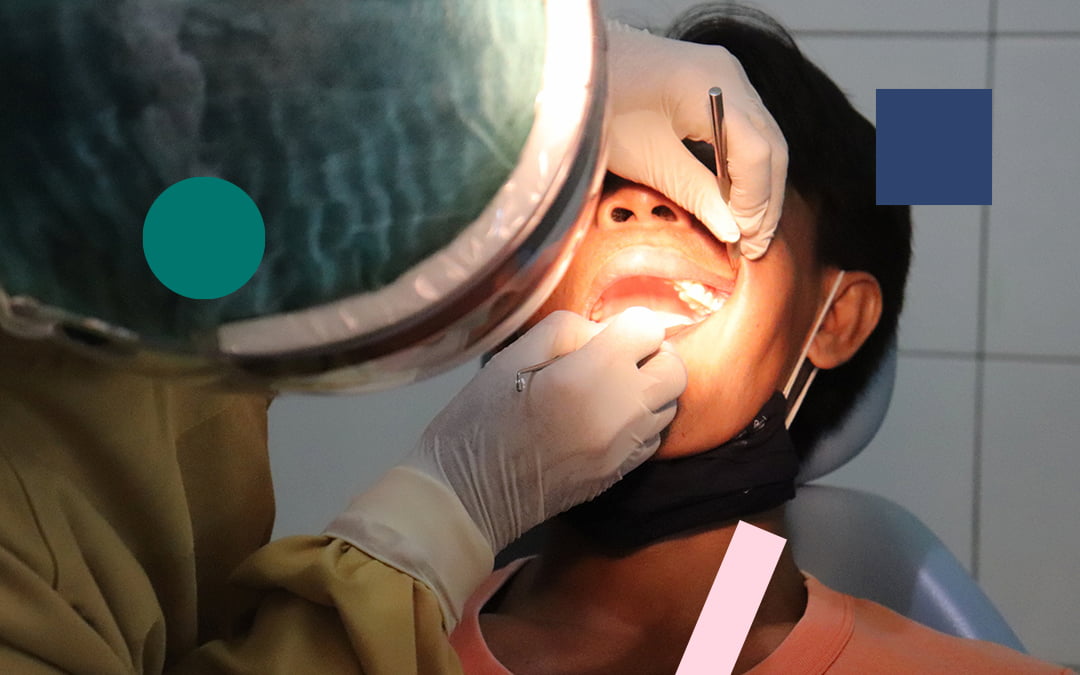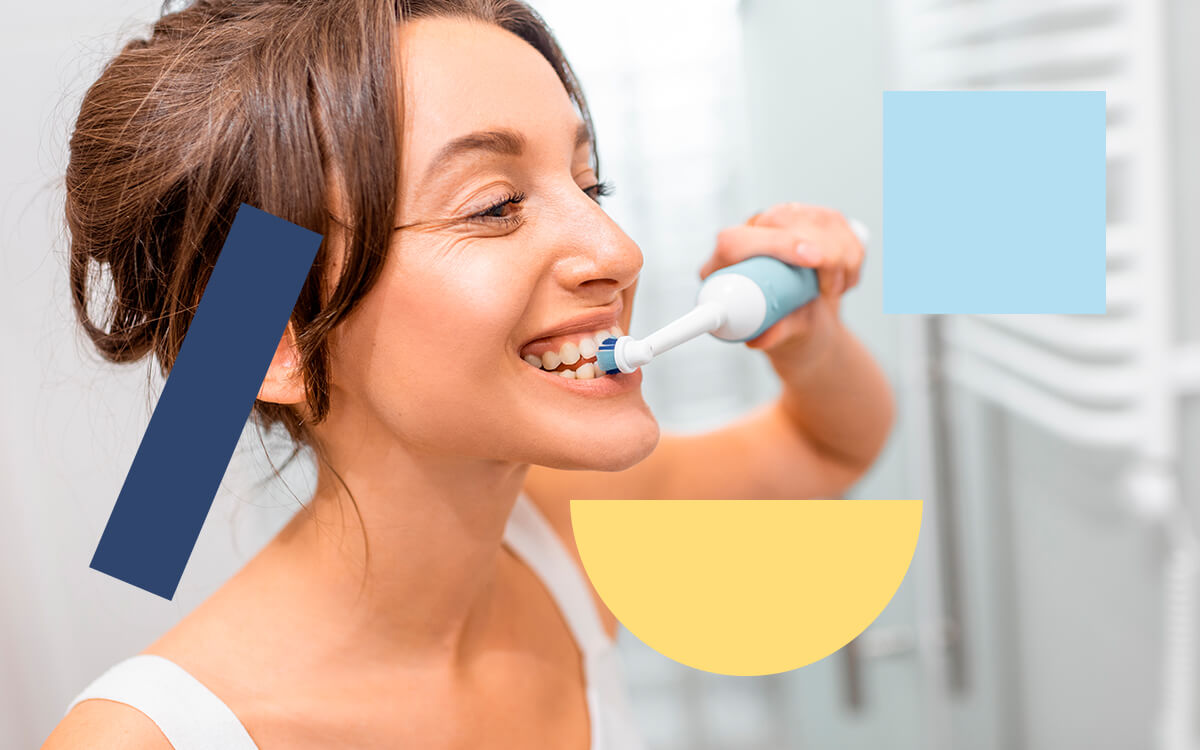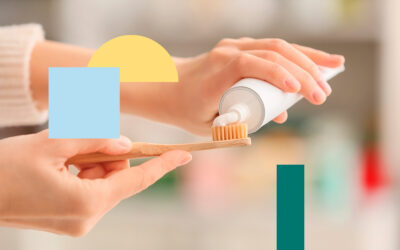To become a hygienist, you must successfully complete the two-yeartraining course for a Higher Technician in Oral Hygiene and, in order to become a great professional in the field, it is essential to undergo continuous training that allows you to keep up to date with all the new developments that come onto the market and to broaden your knowledge.
- 1 Who is an oral hygienist?
- 2 Its tasks are many and varied. Among them, the following stand out:
- 3 What is the job of each member of the dental clinic team?
- 4 Relationship and regular dental health checkups
- 5 Discover our products for professionals
- 6 How does the first consultation with the hygienist usually work?
Who is the oral hygienist?
The oral hygienist is the dentist's right-hand man and plays an essential role in both patient care and dental practice management.
Its tasks are many and varied. These include:
- Disinfection and sterilisation of equipment and surfaces limiting possible cross-contamination.
- Assist the dentist by providing the necessary instruments when required, retracting soft tissues, preparing impression materials, developing x-rays or taking x-rays if qualified to do so.
- Apply topical fluorides with buckets to prevent the development of dental caries.
- Toremove dental calculus and stains for the maintenance of periodontal health and to restore the stained tooth to its natural colour by polishing the most superficial layer of tooth enamel. To perform this procedure, different mechanical devices specialised in polishing and smoothing the tooth surface and removing tartar must be used.
- To place fissure sealants to reduce the retentive capacity of the occlusal surfaces of the molar teeth of children at risk of caries.
It should be noted that none of the hygienist's functions are independent of the dentist, as it is the dentist who supervises his or her work.
Surveys show that 95% of hygienists are women and 90% of them work in private clinics. Those who choose this profession do so by vocation and are usually empathetic, friendly and eager to help people. These professionals are usually dedicated to their work and there are even several hygienists who collaborate in international solidarity projects and selflessly provide optimal oral care as well as carrying out dental hygiene awareness campaigns.
What is the job of each member of the dental clinic team?
While each person working within the dental practice has different roles and responsibilities, each job is critical to the proper delivery of patient care.
When they come to the clinic they may meet the reception staff, the assistants, the hygienists and the dentists, all working as a team, with well-defined occupations.
Reception staff
They are responsible for managing schedules and providing initial information to patients, among other duties. They are often the patient's first contact with the clinic, so they should be characterised by their friendliness and ability to provide service.
Dental assistants
They are responsible for assisting the dentist in the dental office and helping him/her with the preparation and shipment of laboratory equipment.
Dental hygienists
It is responsible for carrying out reversible treatments for patients, the most common of which include the teaching of hygiene techniques and dental cleanings.
Dentists and specialists
They are responsible for the diagnosis, treatment and follow-up of the most severe ailments that patients who come to the dental clinic may present, being treatments of a reversible and irreversible nature.
Relationship and regular dental health check-ups
One of the priority objectives for professionals in the sector when a patient comes for a consultation is that, when the patient leaves the clinic, he or she has sufficient resources and knowledge about how to maintain proper oral health.
It is then that the hygienist, with a great deal of training in health education, must present all his or her knowledge, adapting it to the level of the recipient in order to encourage responsible behaviour on the part of the patient towards their health in general and their oral hygiene in particular. This is where the way of communicating comes into play, because if the message does not get across correctly or is inappropriate to our situation, the hygienist's efforts to teach good health will not have been worthwhile.
The dialogue should be two-way, patients should tell the professional about their problems with hygiene materials, oral hygiene routines and doubts about which product is the right one for their treatment. An exchange of ideas is essential and the hygienist must be able to give the patient all the necessary information regarding our oral problems. In a climate of trust, the hygienist will talk to the patient and empathise with their situation in order to advise them on the hygiene products and methods that are best suited to each individual case.
One of the hygienist's duties that is extremely important for good oral health, in addition to daily care, is professional dental cleanings, as these treatments help to prevent diseases such as gingivitis, periodontitis or halitosis, which are of great concern to the population. Furthermore, it helps to prevent cardiovascular diseases or diabetes, which at first sight do not seem to have any relation with oral health, but multiple studies show that the health of the mouth is closely related to general health. Exclusive products for the needs of oral health professionals.
Discover our products for professionals

Six out of every ten Spaniards who have not been to the dentist in the last year claim that they have no dental problems, but it is worth noting that visiting the dentist regularly saves time and money, as it avoids serious illnesses that require increasingly more expensive treatment the longer it takes to treat them. For example, if the dentist notices a cavity in the enamel during a check-up visit to the dental clinic, it can be treated easily and cheaply.
However, if left untreated, the caries can become so large that it affects the nerve of the tooth, making endodontics necessary, or if the check-up is prolonged, the caries can become so large that there is no hard tissue left for restorative treatment and extraction and subsequent replacement with implants is necessary, entailing a much higher cost and a treatment that could have been avoided with a filling.
How does the first consultation with the hygienist usually work?
The aim of the professionals in the first consultation at the clinic is to provide health education and teach good prevention of dental caries, as it is a highly prevalent disease that can be avoided with proper oral hygiene, healthy dietary habits and the use of fluorides.
During the visit, the hygienist will recommend the type of toothbrush that best suits both the oral cavity and the patient's motor skills. It should be borne in mind that the toothbrush should reach all teeth, including wisdom teeth if present, and that if the handle is too short it will not be possible to reach the posterior areas easily.
The soft brush from Laboratorios KIN has soft filaments and a triangular-shaped brush head that allows easy access to any space. It also has an anatomical handle with ridges that facilitate a good grip and reduce the risk of lacerations.
The dental hygienist will be able to instruct the patient on the proper brushing technique with both electric and manual toothbrushes and will recommend a toothpaste with a suitable composition that adapts to the patient's specific needs. He/she will also indicate how interdental brushes and/or dental floss should be used, stressing the importance of their use.




 What to consider when choosing the best electric toothbrush?
What to consider when choosing the best electric toothbrush? How to relieve pain with newly placed braces?
How to relieve pain with newly placed braces? How to keep your breath fresh?
How to keep your breath fresh?

